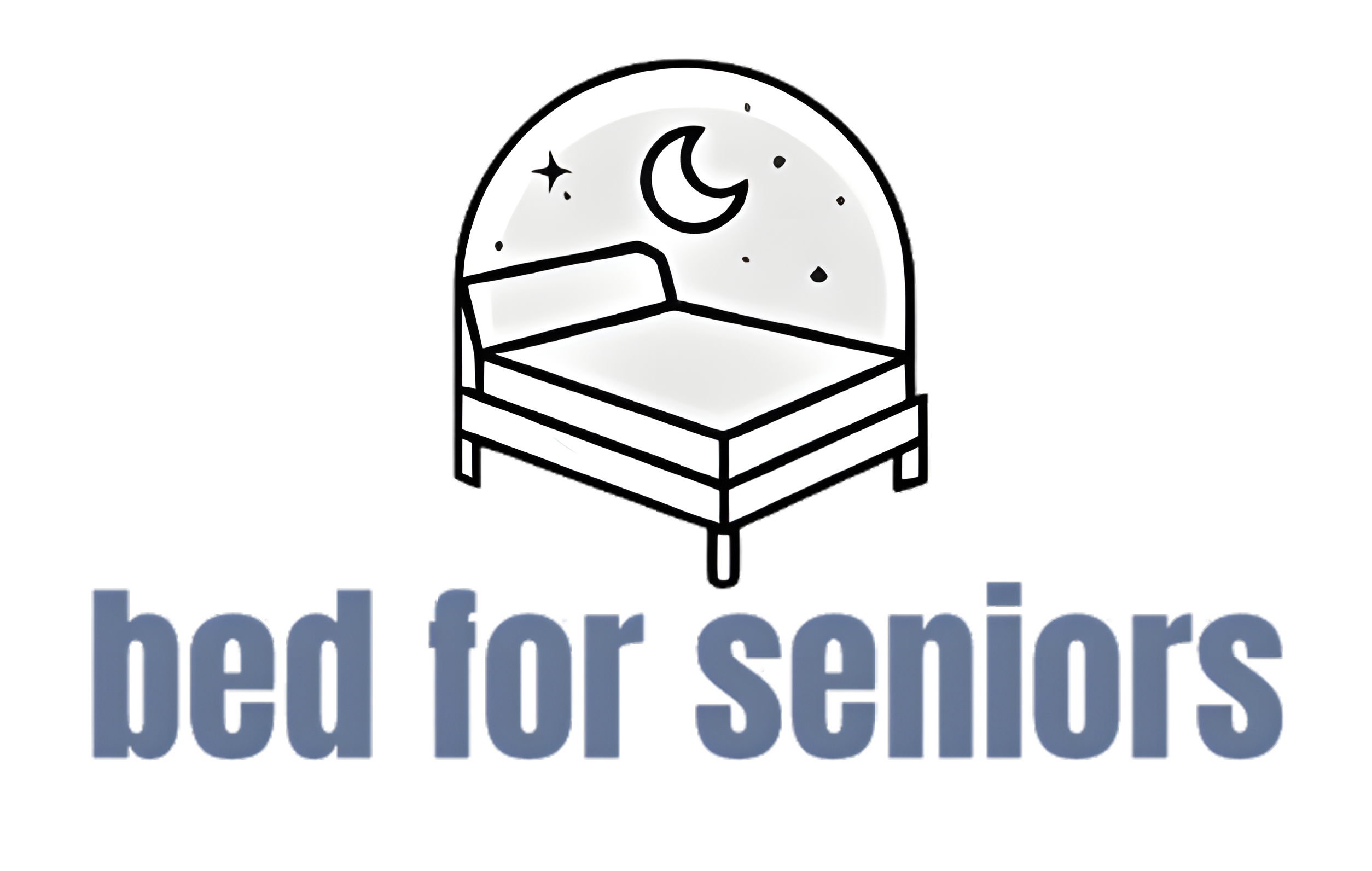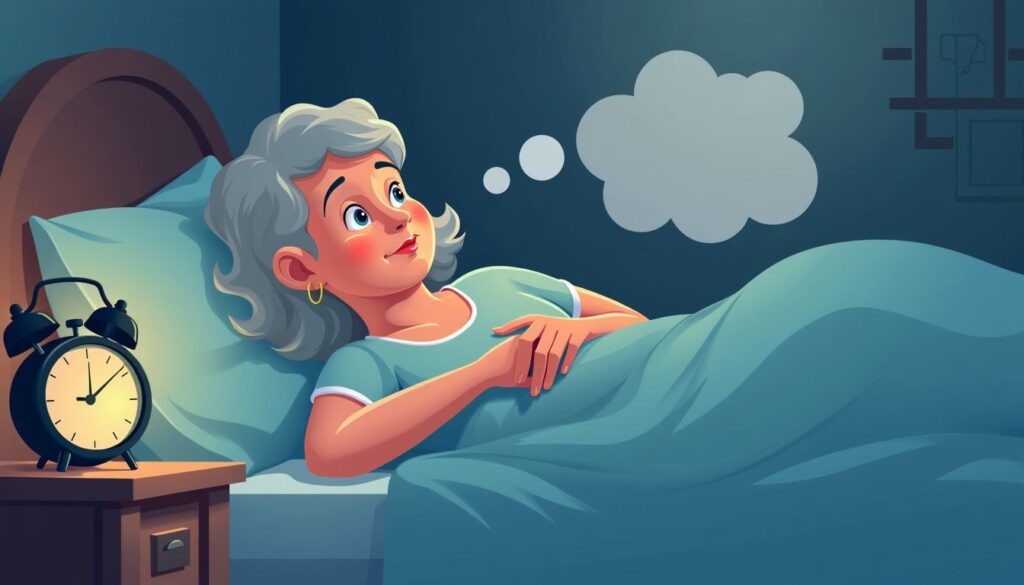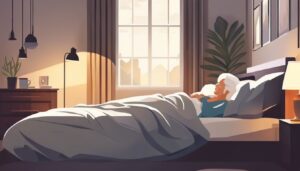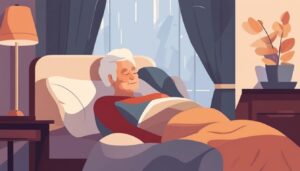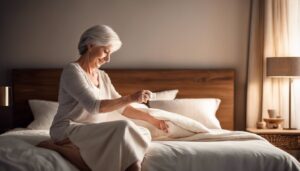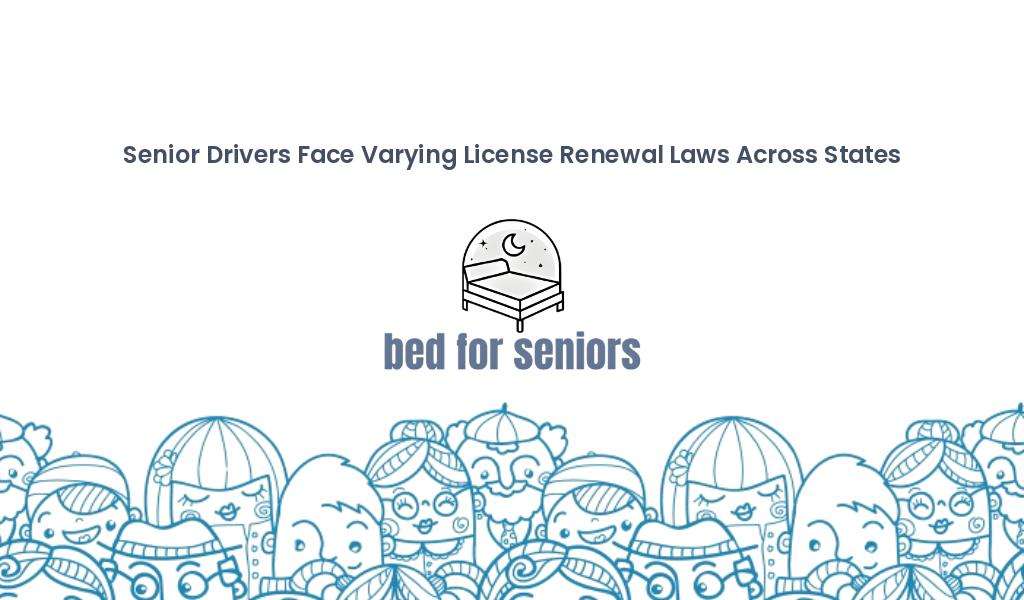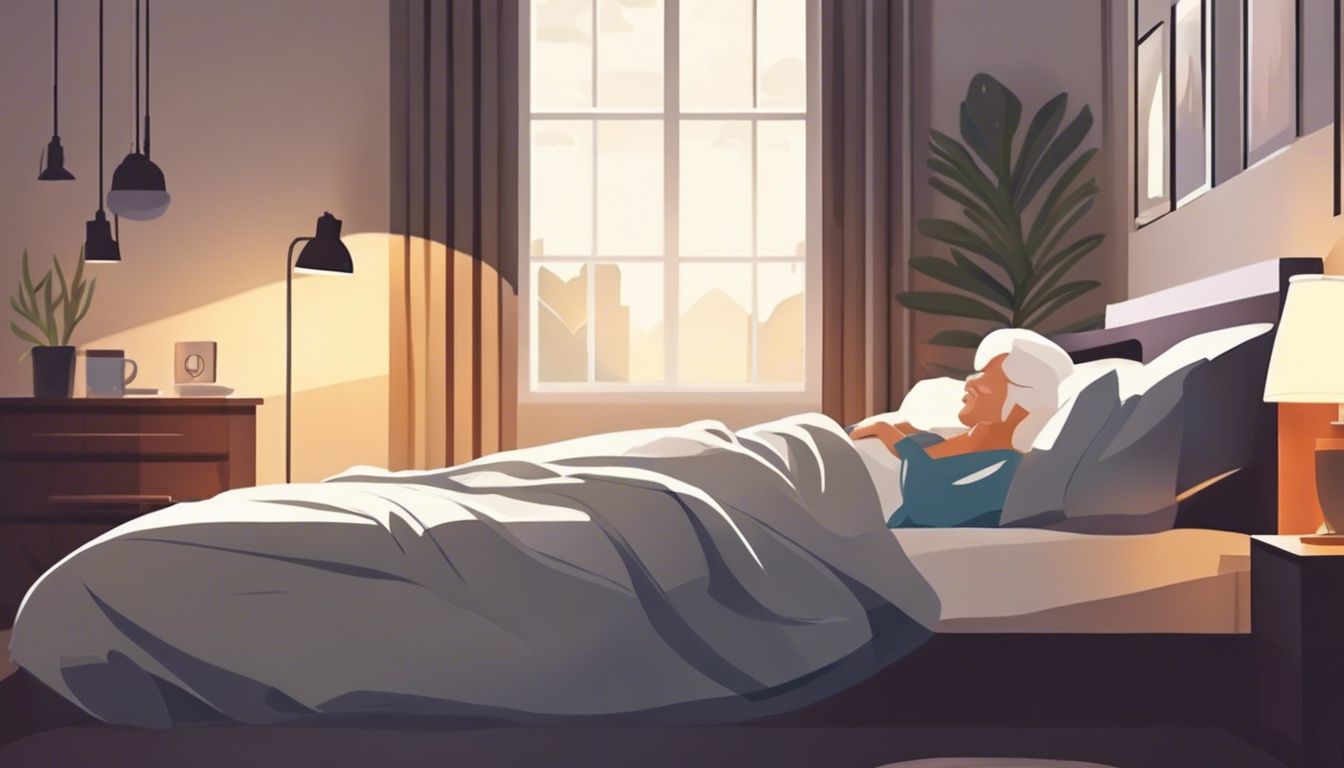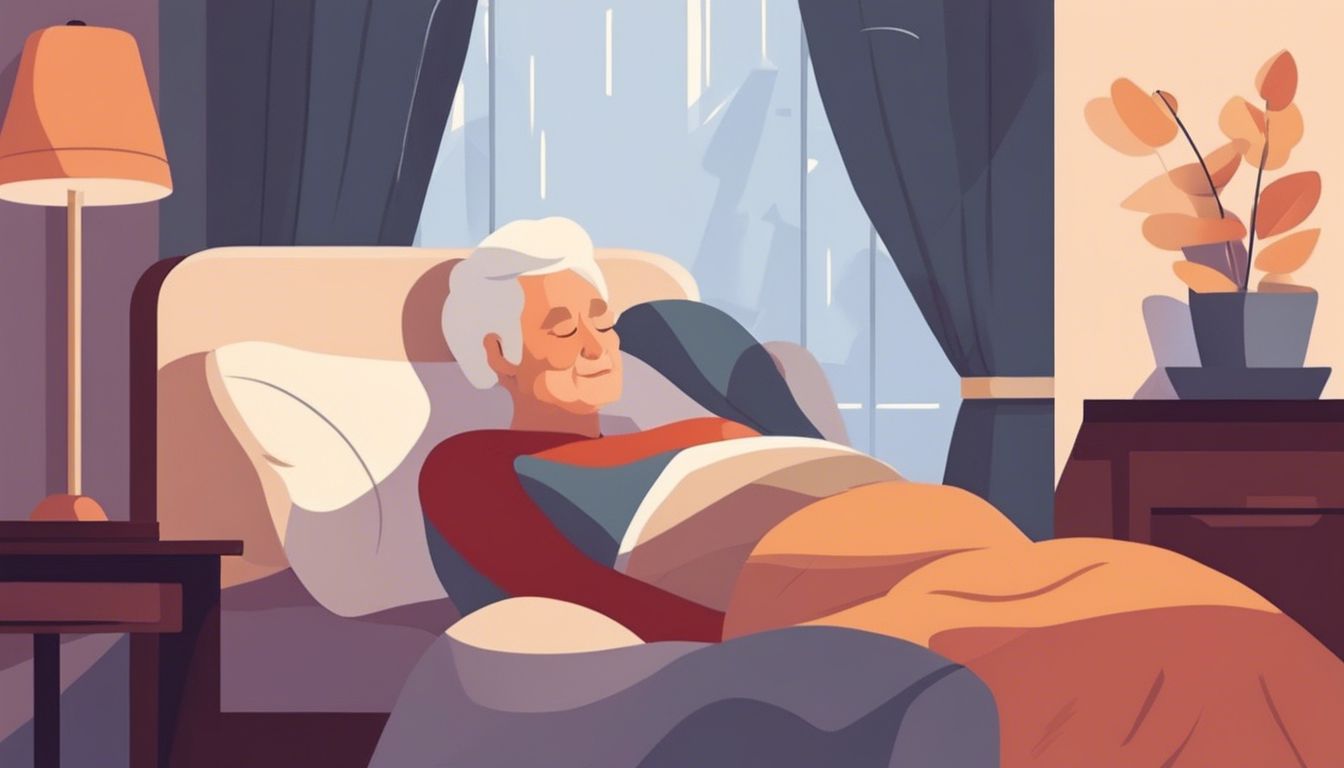Having trouble sleeping at night can be frustrating. This issue is common among older adults. Our article will explain why this happens and how to tackle it. Keep reading for helpful tips.
Key Takeaways
- Health issues and medicines can cause sleep problems in older adults. Conditions like Alzheimer’s, arthritis, and the use of certain drugs mess with their sleep.
- Bad sleep habits and changes in where they live affect their rest too. Naps and a bad sleeping space make it hard for them to stay asleep.
- Their bodies change as they get older, making deep sleep shorter. Also, they make less melatonin, which helps with sleep.
- Some have specific sleep disorders like restless legs syndrome or trouble breathing at night that keep them awake.
- Making changes in how they live and fixing their sleeping area can help. Doctors also suggest different treatments if lifestyle changes don’t work.
Primary Causes of Insomnia in Older Adults
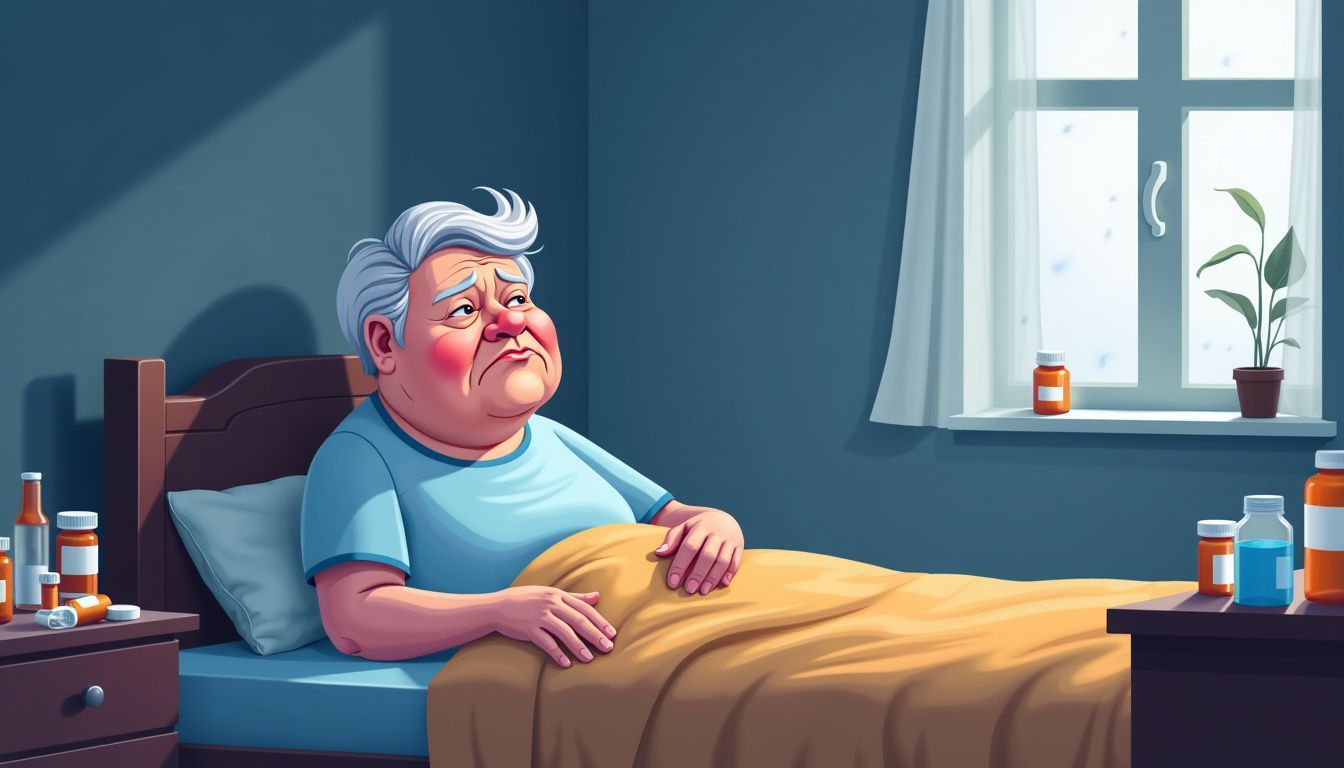
Insomnia in older adults often starts with health problems or medicine they take. Changes in how they live and where they sleep also play big roles.
Medical Conditions
Certain medical conditions can lead to sleep problems in older adults. Alzheimer’s disease, chronic illnesses, and depression are big reasons. They all change how seniors sleep. For example, pain from health issues like arthritis makes it hard to stay asleep.
Nocturia, or waking up often to go to the bathroom, also disrupts sleep.
These conditions often need different treatments to help with insomnia symptoms. Doctors might suggest changes in medication or lifestyle adjustments for better sleep quality.
Medications or Drugs
After talking about medical conditions, it’s clear that medications or drugs play a big role in insomnia among older adults. Many medicines can mess with sleep. For example, blood pressure drugs, antidepressants, and over-the-counter cold remedies often disrupt sleep patterns.
They might make it hard to fall asleep or stay asleep. Also, alcohol use is a common cause of sleep disturbance.
Let’s not forget that some treatments for chronic conditions can lead to poor sleep too. Drugs like steroids or asthma medicine can keep seniors awake at night. It’s important for caregivers to look at all the medicine someone takes.
This way, they can see if any of them could be causing sleep problems. Switching medicines or changing when you take them might help improve sleep.
Lifestyle Factors
Older adults often face sleep issues because of bad sleep habits and not moving enough during the day. Taking naps too often and not keeping a regular bedtime make it harder to fall asleep at night.
This leads to waking up often and feeling tired during the day. Keeping active and avoiding naps can help improve sleep quality.
Next, environmental changes also play a role in how well seniors sleep…
Environmental Changes
After discussing lifestyle factors, we see that the place where older adults sleep also matters a lot. Unsuitable sleep environments make it hard for them to rest well. Bright lights and loud noises can disrupt anyone’s sleep, more so for seniors.
Their bedrooms should be dark, quiet, and cool to help them fall asleep faster.
Adjustments in the body’s internal clock mean they might react strongly to changes in their sleeping space. For good sleep hygiene, keeping a regular schedule helps too. Making sure their room is set up for sleep will improve their chances of resting well through the night.
How Aging Affects Sleep
As you get older, your sleep changes a lot. You might notice it’s harder to stay asleep, and sometimes you wake up too early. This happens because of how our bodies change with age.
Keep reading to learn more about what affects your sleep as you age.
Changes in Sleep Architecture
Older adults usually have lessened deep sleep phases, implying they spend fewer hours in the slow-wave, non-rapid eye movement (NREM) sleep. Deep sleep assists in rejuvenating the brain and body but with advancing age, these periods tend to lessen.
Further, older individuals experience more instances of wakefulness at night, interrupting their rest.
Their rapid eye movement (REM) sleep phases also diminish. REM sleep plays a significant role in memory consolidation and learning. Due to a decrease in REM stages, elders may find remembering information or acquiring new abilities more challenging.
These alterations in sleep architecture influence their daytime well-being.
Alterations in Circadian Rhythms
Seniors often face changes in their sleep-wake cycles. Their internal clocks shift, making it hard for them to fall asleep or wake up at the right times. This problem gets worse because seniors are more likely to have circadian rhythm disorders.
These shifts mean they might not feel sleepy until late at night. Or they wake up too early in the morning.
This trouble with sleeping can lead to other issues, like feeling tired during the day. It’s important to look into these changes as they can greatly affect health and daily life. Next, we will talk about hormonal changes that also impact sleep in older adults.
Hormonal Changes
Hormones play a big role in sleep. As people get older, their bodies make less melatonin. This change can lead to sleep problems like insomnia. The drop in melatonin makes it harder for them to fall asleep and stay asleep.
These changes are part of why seniors often have trouble sleeping at night. They might wake up early or feel tired during the day. Understanding this helps us find better ways to improve their sleep.
Common Sleep Disorders Linked to Insomnia in Seniors
Older adults often have trouble sleeping because of specific sleep problems. Some of these include breathing issues during sleep, restless limbs, moving their legs often while asleep, and acting out dreams.
Sleep-Related Breathing Disorders
Sleep-related breathing disorders, like sleep apnea, are common in older adults. These issues make it hard for them to breathe well while they sleep. This leads to poor sleep and makes insomnia worse.
Doctors use tools like polysomnography—a kind of sleep study—to check for these problems. Treatment may include devices that help keep the airway open at night. These steps can improve sleep and reduce symptoms of insomnia in seniors.
Restless Legs Syndrome
Moving on, let’s talk about Restless Legs Syndrome (RLS). This condition really affects how well older adults sleep. It makes their legs feel uncomfortable when they lie down, so they have to move them around a lot.
This happens more as people get older. Because of RLS, many find it hard to get enough sleep or stay asleep. They might wake up tired and not feel rested during the day. This can make everyday tasks harder for them.
Periodic Limb Movements
Periodic Limb Movements make legs twitch or kick during sleep. This can wake people up often. It breaks the flow of sleep, making it hard to stay asleep. Imagine the legs moving on their own while trying to rest; it’s unsettling and disrupts deep sleep phases.
Such movements are a big reason for sleep loss in older adults. They happen without warning and vary in how severe they are from night to night. After talking about Periodic Limb Movements, we’ll explore another condition that disturbs sleep – REM Sleep Behavior Disorder.
REM Sleep Behavior Disorder
REM Sleep Behavior Disorder makes people act out their dreams. They might talk, yell, or move a lot in their sleep because of it. This disorder causes them to wake up often at night.
It’s sure that this happens during the REM stage of sleep. This is when dreams occur. People with this condition may not get enough rest and feel very tired during the day.
Symptoms of Insomnia in Older Adults
Older adults may have trouble sleeping, wake up often at night, find themselves getting up too early, and feel tired during the day. Keep reading to learn more!
Difficulty Falling Asleep
Many older adults find it hard to start sleeping. Anxiety and health problems make this worse. They lie in bed unable to sleep, tossing and turning. This is a big part of having insomnia.
Doctors suggest keeping a sleep diary to understand the problem better. In it, you write down when you try to fall asleep and when you actually do. This helps find patterns or reasons for trouble sleeping.
Relaxation techniques can also help calm the mind and body before bed, making falling asleep easier.
Waking Up Frequently During the Night
After finding it hard to fall asleep, waking up often during the night is next. Older adults face this challenge a lot. Their sleep breaks many times without any health problems causing it.
This can lead to feeling tired in the daytime.
Waking up too much at night affects how much deep sleep they get. Without enough deep sleep, their bodies don’t rest well. Making sure the bedroom is quiet and dark can help them stay asleep longer.
Also, cutting down on caffeine and naps in the afternoon might improve their night’s rest.
Early Morning Awakenings
Older adults often wake up early in the morning and can’t fall back asleep. This trouble is common. Their bodies mix up night and day. These early awakenings can make them tired during the day.
To get better sleep, it’s good to know why this happens. We will look at sleep-related breathing disorders next.
Daytime Fatigue
Daytime fatigue makes daily tasks hard. It comes from not sleeping well at night. People feel very tired and can’t do their work or enjoy activities. This tiredness is a big sign of insomnia in older adults.
Doctors say daytime sleepiness hurts life quality. It links to mood problems too. Getting help for this kind of sleep issue is important. Caregivers should watch for signs like taking naps often or looking very tired during the day.
Diagnosis and Evaluation of Insomnia in the Elderly
To figure out if an older adult has insomnia, doctors do a careful check-up and ask lots of questions. They might also use sleep studies to look closer at the person’s sleep problems.
Clinical Assessment
Doctors first do a medical history and physical exam to check for insomnia. They ask about sleep habits and look at health problems that might cause trouble sleeping. Keeping a sleep diary helps too.
This means writing down when you go to bed, wake up, and how well you slept. Next comes the sleep studies part with tests like polysomnography.
Sleep Studies and Diagnostics
Doctors use sleep studies, like polysomnography, to find out why someone has trouble sleeping. These tests record brain waves, blood oxygen levels, heart rate, and breathing while a person sleeps.
They also track eye and leg movements. To say someone has chronic insomnia, they must have symptoms at least three times a week for more than three months.
Polysomnography helps spot sleep disorders such as obstructive sleep apnea or restless legs syndrome. This makes sure doctors give the right treatment for better sleep.
Treatment Options for Insomnia in Older Adults
For treating insomnia in older adults, two main paths exist: non-medication and medication treatments. Simple lifestyle tweaks can greatly improve sleep, while drugs should be a careful choice, considering side effects.
Non-Pharmacologic Treatments
Treating insomnia in older adults doesn’t always mean taking medicine. Cognitive Behavioral Therapy for Insomnia (CBT-I) is a powerful way to improve sleep without drugs. Here’s a list of non-pharmacologic treatments that really help:
- Set a regular sleep schedule. Go to bed and wake up at the same time every day.
- Make the bedroom comfortable for sleeping. Keep it dark, quiet, and cool.
- Try relaxation techniques before bed, like deep breathing or meditation.
- Limit naps during the day to improve nighttime sleep quality.
- Exercise regularly but not right before bedtime.
- Avoid caffeine, nicotine, and alcohol close to bedtime since they can disrupt sleep.
- Use the bed only for sleep and intimacy to strengthen the association between bed and sleep.
- Practice good eating habits by avoiding large meals before bedtime.
- Get exposure to natural light during the day, especially in the morning, to help maintain a healthy sleep-wake cycle.
- Consider trying Sleep Restriction Therapy (SRT), a method where you limit your time in bed to increase sleep efficiency.
Next, we’ll explore how certain lifestyle and environmental changes can further aid seniors battling insomnia.
Pharmacologic Treatments
Doctors often use medicines to help older adults sleep better. These treatments can work well but need careful handling.
- Melatonin receptor stimulants, like ramelteon, make the body ready for sleep.
- Orexin blockers, such as suvorexant, stop wake signals in the brain. This helps people stay asleep.
- Zolpidem and similar medicines change brain activity to promote sleep.
- Antidepressants, including trazodone, can help when stress causes sleep trouble.
- Antihistamines are common in over-the-counter sleep aids but may cause drowsiness during the day.
- Benzodiazepines like temazepam affect the brain’s chemical balance to induce sleep but can lead to dependence.
- Non-benzodiazepine drugs such as eszopiclone and zaleplon offer fewer side effects and risks of addiction.
- Doctors suggest using sleeping pills for a short time to avoid problems like tolerance or dependence.
Each medicine works differently, so it’s important to follow a doctor’s advice closely.
Lifestyle and Environmental Modifications
Changing how older adults live and where they sleep can improve insomnia. Making these changes helps manage sleep disturbances better.
- Keep bedrooms dark, quiet, and cool to create a calm sleeping environment.
- Avoid large dinners close to bedtime to prevent discomfort that can keep them awake.
- Reduce screen time before bed, especially in the bedroom, to decrease mental stimulation.
- Encourage natural light during the day to help maintain a healthy sleep-wake cycle.
- Set a regular sleep schedule by going to bed and waking up at the same times every day.
- Limit naps during the day so they do not impact nighttime sleep.
- Exercise regularly but not too close to bedtime as it can energize instead of relax.
- Use comfortable mattresses and pillows that support good sleep posture and comfort.
- Avoid caffeine and alcohol late in the day since both can disrupt sleep cycles.
- Create pre-sleep rituals like reading or listening to calm music to signal the body it’s time for bed.
- Manage stress with techniques like deep breathing or meditation for better relaxation at night.
- Try earplugs or white noise machines if outside noises disturb their sleep regularly.
These steps are direct ways caregivers can reshape both habits and environments around elderly individuals’ rest periods, leading toward more peaceful nights and less disturbed sleep patterns, tackling primary causes of insomnia effectively
Understanding Early Morning Awakenings in the Elderly
Older adults often wake up early in the morning. This happens because their sleep patterns change. As they age, deep sleep gets shorter. Their body clock shifts too, making them sleepy earlier and awake sooner.
Hormones that help with sleep drop in older people.
Many have trouble sleeping through the night without waking up. They might get up because of pain or to go to the bathroom. Early waking can make them tired during the day. It’s a big reason why some feel they don’t sleep well.
For these reasons, it’s clear why early morning awakenings happen in the elderly. Changes in how they sleep and their bodies play a big role.
When to Speak to a Doctor
Moving from the topic of early morning awakenings, it’s clear seeing a doctor plays a crucial role. Frequent nighttime wake-ups signal it’s time for expert advice. If these sleep troubles mess with daily life, that’s another big reason to get help.
It shows something more than just bad nights might be at play.
Doctors can dig into causes like medical conditions or the impact of certain meds. They could look into if heart disease or restless legs syndrome are keeping you awake. Knowing when to reach out is key for better sleep and health overall.
Conclusion
Insomnia in older adults comes from many places. Health problems, medications, and even changes in their sleep patterns play roles. Their bodies handle sleep differently as they age.
This includes less deep sleep and shifts in when they feel sleepy or awake. Also, conditions like restless legs syndrome add to the trouble. Taking care of these causes may help improve their rest.
It’s clear that a mix of health care and lifestyle changes can make a big difference for better sleep in seniors.
To learn more about why older adults may experience early morning awakenings, visit our detailed guide here.
FAQs
1. What triggers insomnia in older adults?
Insomnia in older adults can be triggered by a variety of factors such as chronic pain, psychiatric conditions like anxiety disorder or bipolar disorder, and sleep disorders including restless leg syndrome and periodic limb movement disorder.
2. Can medications cause insomnia in the elderly?
Yes, certain drug administrations—particularly doses of sleep medications like diphenhydramine—can lead to disrupted sleep or even rebound insomnia.
3. How does lack of proper sleep affect senior citizens?
Lack of adequate total sleep time can result in severe health issues for seniors, including mental illness and increased risk for stroke. Sleep deprivation also contributes to disability due to impaired cognitive function.
4. Does caregiving contribute to insomnia among older adults?
Indeed! The stress associated with caregiving often leads to anxiety that disrupts normal NREM (Non-Rapid Eye Movement) and slow wave sleep stages causing difficulty sleeping at night.
5. Are there specific types of insomnia common among the aged population?
Primary insomnia and Insomnia Disorder as classified by ICSD-3 (International Classification of Sleep Disorders) are commonly seen amongst older adults often linked with psychiatric disorders or physical ailments disrupting their regular sleep-wake cycle.
6. Is it true that some medical conditions can lead to poor quality slumber in seniors?
Absolutely! Conditions such as psychiatric disorders, chronic pain from illnesses or injuries, and even problems like sleep-disordered breathing can all lead towards fragmented rest resulting into a state termed as “insomnia”.
